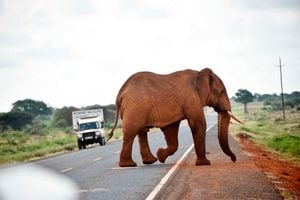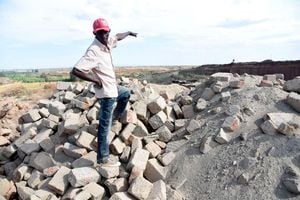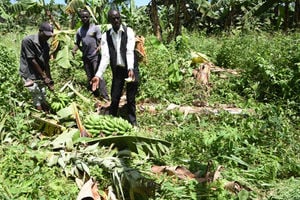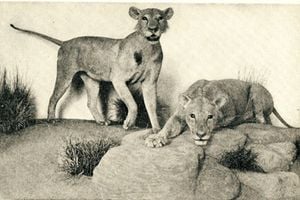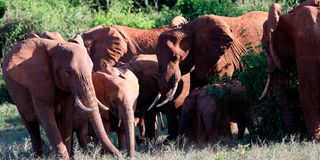
Elephants feeding at the Taita Hills Wildlife Sanctuary within the Tsavo West National Park in Taita Taveta County in January. People living around the park are in constant fear.
For Zeina Mnyapara, a farmer from Kirumbi village in Voi sub-county, Taita Taveta County, the long-awaited compensation for the destruction of her crops by elephants in 2016 has turned out to be a cruel joke.
After waiting for more than seven years, she travelled to Voi town in September this year only to find that a mere Sh800 had been paid into her account by the government through the Ministry of Tourism and Wildlife.
She used the money to buy a kilogram of sugar and maize flour and to pay for her return home.
"My whole farm was destroyed, but unfortunately the compensation from the government is meagre," she said.
Mnyapara is one of the "lucky" residents who, after years of waiting, finally received a small amount of compensation.
More than 2,100 people in the county are still waiting to hear the fate of their wildlife damage claims, while KWS is facing allegations of corruption and negligence.
Some of the claims date back to 2016, raising questions about the government's commitment to paying victims and addressing the challenges of human-wildlife conflict in the region.
According to the County Wildlife Conservation and Compensation Committee (CWCCC), pending claims for deaths, injuries, crop destruction, property damage and livestock depredation have yet to be verified and approved due to a lack of funds to support the 13-member team.
According to the Wildlife Conservation and Management Act 2013, the committee comprises a chairperson appointed by the Cabinet Secretary – this is the County Commissioner; four persons, who are not public servants, nominated by the community; an officer from KWS who is the secretary; and other relevant technical officers at the county government level.
The committee reviews all applications and makes recommendations to the Ministerial Wildlife Compensation Committee, which validates and approves the payment of awards by the CWCCC.
However, County Warden Josephat Erupe, who is also the secretary of the committee, admitted that they have not met for years, citing lack of funds and logistical challenges.
"We are leading countrywide in terms of cases pending approval. Since the committee was formed, we have only had two sittings. Since 2021 to date, we have not had any sittings," he said.
Erupe said that in order to reduce the rampant cases of human-wildlife conflict, the agency was trying to drive wildlife away from community areas.
"We have put all our efforts into creating more than six units to cover hotspot areas. But sometimes the cases are overwhelming," he said.
Erupe was speaking when the National Assembly's Tourism and Wildlife Committee recently toured the Voi and Mwatate areas, where he urged MPs to push for the allocation of more equipment and manpower to bridge the gap.
In July, the government released Sh908 million to compensate victims of human-wildlife conflict. While Taita Taveta received Sh51 million to alleviate the suffering of those affected by wildlife attacks, only a fraction of those on the waiting list benefited, sparking protests and allegations of graft.
Erupe urged residents to be patient and cooperate by providing the necessary documents and evidence to support their claims.
Many residents who border Tsavo National Park in the county have suffered losses of crops, livestock and human lives due to frequent invasions by elephants, lions and leopards, while compensation has been delayed.
However, residents and leaders in the county are not convinced by KWS' assurances.
They have accused KWS and the government of being insensitive and indifferent to the suffering of the people who bear the brunt of living with wildlife.
They also claim that the compensation process is rife with corruption and inefficiency, leading to delays, inconsistencies and discrimination.
They questioned the criteria used to select beneficiaries, claiming that some of the recipients were not genuine victims of human-wildlife conflict.
John Mwabutanga said he submitted a claim in 2017 after his entire farm was attacked by elephants, but to date, he has not received any compensation.
"I have been following up with the KWS office in Voi, but they keep telling me to wait. They say they have no money to pay us. I don't know what to do. I depend on farming for my livelihood," he said.
Former Voi MP Basil Mwakiringo alleged that some KWS officials and committee members are colluding with unscrupulous individuals to inflate or falsify claims, while genuine claimants are left out or given peanuts.
Mwakiringo said many victims had been left out of the compensation process despite having valid documents and evidence of their losses.
He called for an audit of the list of beneficiaries and verification of their claims, saying there could be a syndicate of fraudsters exploiting the system.
"We want to know who are these people who have been paid and how did they qualify. We suspect that there is corruption and favouritism involved. We demand that this be investigated and those found capable held accountable for this injustice," he said.
The MP said residents are demanding a fair and transparent compensation process.
"We want the relevant agencies, including the National Assembly’s Tourism and Wildlife Committee, to investigate the list. Some people were compensated [through] false claims," he said.
He also said the compensation rates were outdated and did not reflect current economic realities, calling for a review of the rates and a revision of the Wildlife Conservation and Management Act, 2013, which provides the legal framework for compensation.
Voi MP Abdi Chome said some residents had complained that the amounts paid as compensation were inadequate and did not reflect actual losses.
“Some of my constituents are not happy with the amount they have received. They feel that it is too low compared to the damage they suffered,” he said.
He also called on the government to increase the budget for compensation and review the rates to reflect current market prices.
Mwatate MP Peter Shake said through KWS they would be urging the government to step up efforts to prevent and mitigate human-wildlife conflict by erecting electric fences, digging water pans, providing alternative livelihoods and increasing community participation in conservation.
The escalating human-wildlife conflict in Taita Taveta has been attributed to the proximity of the park, which has forced most of the animals to move into the community area.
The acting chairperson of the National Assembly Committee on Tourism and Wildlife, Alfred Mutai, said the government is committed to compensating victims of human-wildlife conflict but the demand is overwhelming.
He said the government had allocated Sh1 billion for compensation in the current financial year.
"That is why we are working with the executive to ensure that the government explores other ways of addressing the problem such as insurance schemes and also investing in preventive and mitigating measures such as fencing," he said.

